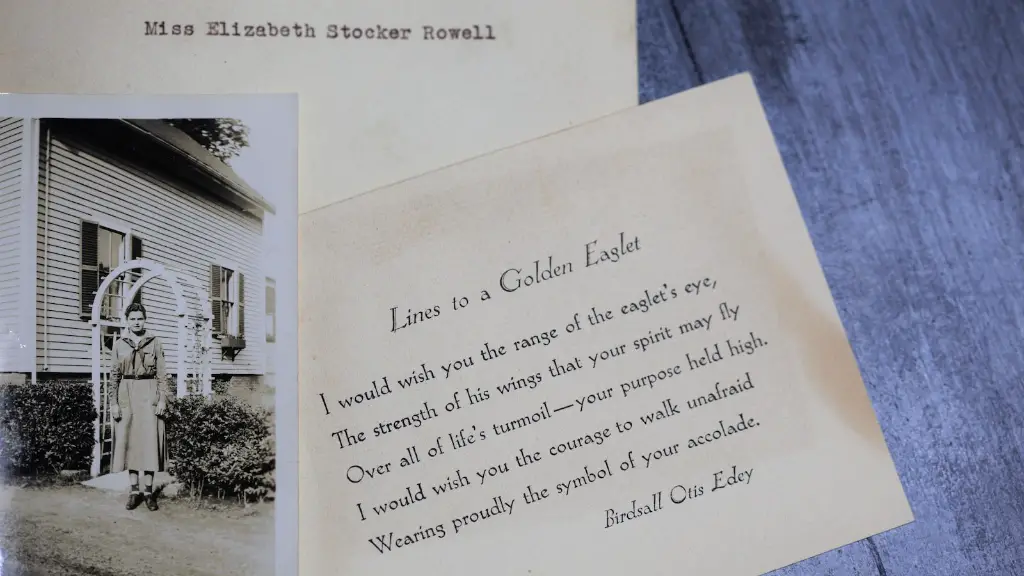What is Poetry Comprehension?
Poetry comprehension is the act of fully understanding, analysing and interpreting a poem, often to uncover its true meaning and deeper significance. It requires knowledge and skill to be able to appreciate the art and beauty of a poetic piece and, as such, is viewed by many as an important part of literature appreciation, especially given its close ties with other forms of creative writing.
In order to truly understand a poem, readers must be able to identify and appreciate its literary techniques, such as imagery and symbolism, as well as its underlying structure and nuances. It is only by doing so that readers can start to unravel the deeper layers of meaning within each and every poem. These can range from ideas and themes about life, society or the human condition, to more emotional themes such as joy, sorrow and love.
One of the most fundamental and important aspects of understanding any kind of poetic text is being able to identify the emotional and psychological traits of the writer. Every poet has a unique and personal way of expressing themselves, as well as their own worldview and experiences that can be expressed through their work. By understanding the writer, it can be much easier to appreciate the poem for what it is and its intended meaning of the words on the page.
In addition to recognising the writer’s intentions and the poem’s structure and use of language, the reader must also be able to identify the poem’s message. This requires looking at the poem critically and using the context of the surrounding words to support it. By doing so, the overall essence and core of the poem can be more easily derived and appreciated.
Moreover, as poem is such a personal and in-depth form of writing, readers must take into account that what works for one person may not necessarily work for another, and interpreting a poem is often more of an individual experience. It is therefore important for the reader to look not only for the literal meaning of the words but also take into consideration their own personal thoughts and emotions, allowing them to build a deeper connection with and better understanding of the poem.
Figurative Language
Figurative language is a key component to understanding poetry. It is used by poets to bring emotion, vibrancy and colour into their writing. It can also often help to further elevate the poetic experience and make the poem come to life in a reader’s mind. As such, it is an important part of understanding poetry used by many of the world’s top poets and is a critical aspect of studying the genre.
Figurative language is a type of writing that uses words or phrases not in their literal sense, but instead to suggest a certain image or feeling. Common examples of figurative language include metaphors, personification and similes, all of which provide the reader with a more engaging and thought-provoking image when compared to standard language.
Understanding figurative language allows readers to gain more insight into the poem’s meaning, finding deeper connections and interpretations than might otherwise be visible. It also allows the reader to gain a better sense of the writer’s thoughts and emotions and allows the work to resonate with them more.
In addition, the use of figurative language can also provide additional clues and ideas for readers to effectively interpret the poem. By noticing which words and phrases the poet has chosen to use and their implications, readers may be able to gain insight into its deeper meaning, thus helping to further their understanding of the work.
Poetry Analysis
Poetry analysis is another essential aspect of understanding poetry. It involves looking beyond the words of the text itself to the ways in which it conveys its meaning to the reader. This can include anything from analysing the poem’s structure and form, as well as its tone and style, to looking for deeper implications and understanding of its symbols and themes.
Each of these elements are key for building a complete picture of the poem and understanding its deeper meaning. By looking at each of these in isolation and considering their implications and connections within the text, readers can start to build an overall view of the poem’s core message and its impact on them.
In addition to this, poetry analysis also involves looking at the context of the poem and the writer’s background. By understanding the writer and their life experiences, readers may be able to gain greater insight into the poem’s deeper elements and motives, as well as its intended impact.
Moreover, looking at a poem analytically can help to build readers’ literacy skills and allow them to more effectively appreciate and understand the poem in its entirety. By doing so, readers can start to appreciate the beauty and craftsmanship of the poem and its impact on the reader.
The Role of Emotions
The role of emotion in understanding poetry is incredibly important. A poem often conveys strong emotions and feelings, and as such, it is necessary for readers to recognise and appreciate these elements in order to gain a complete understanding of the work.
By understanding the underlying emotions of a poem, readers may be able to identify deeper aspects of the poem and the emotion which underlies its meaning. This may be anything from happiness to sorrow, joy to anger or confusion. As such, it is always important for readers to look for the emotions within a poem and take them into consideration when considering its overall message and meaning.
Moreover, emotions also play an important role in connecting readers to the poem. A good poem should leave the reader feeling something, and understanding the underlying emotions can be key to achieving that.
By connecting with a poem on an emotional level, readers are often able to gain a much greater appreciation of the poem and its true power and beauty. This can create a lasting impression and shape the reader’s interpretation of the work in a positive way.
Developing Poetry Comprehension
Developing a good understanding and appreciation of poetry is something that any reader can achieve with the right attitude and skills. It is a process which requires time and effort, but is incredibly rewarding for any reader who truly wants to unlock the power and beauty of this form of written expression.
One of the best ways to develop an appreciation for poetry is to read and study it. By reading as many different poems as possible and analysing the words, structure and themes of each work, readers can start to develop a natural knowledge and intuition for the genre and gain a better understanding of how to interpret and analyse it.
In addition to reading poems, it is also essential to understand the poet’s background and experiences. This can allow readers to gain further insight into the poem’s many layers of meaning and understand its motivations and influences.
Practising poetry analysis is another great way to build a stronger understanding of poetry. This can involve reading a poem aloud and writing down reactions and observations, and then reflecting on them afterwards. This can help to deepen readers’ understanding of the poem’s meaning and message, as well as its underlying structure and form.
The Power of Poetry
At its core, poetry is a unique and powerful form of written expression that allows readers to explore the depths of human experience and emotion. Its ability to convey strong messages and evoke strong emotions from readers is unparalleled, and to fully appreciate its power, readers must work to understand the poem on a deeper level.
By doing this, readers can gain access to the poem’s many layers of meaning and emotion, allowing for a greater appreciation of the poet’s intention and craftmanship. This in turn allows readers to gain a greater appreciation of the poem itself and the power of poetic language.
In addition, understanding poetry is often a gateway to larger, deeper discussions and debates. What we uncover in a poem can often be applied to real-world events and scenarios, creating further room for debate and discussion.
Poetry comprehension is, therefore, a highly valuable and rewarding endeavour, offering readers the chance to experience and explore some of life’s most powerful and emotional ideas. By truly understanding a poem, readers can start to find deeper connections with its true meaning and beauty, allowing them to make their own interpretations and gain a greater appreciation of the genre.
The Role of Context
Context plays a huge role in understanding poetry. All poetry is written and interpreted within a specific cultural and historical context, and a reader’s understanding of and appreciation for the poem can often be greatly enhanced if they are familiar with and understand this context.
For instance, a reader might be more likely to identify the poem’s deeper meanings and interpretations if they know the context in which it was written. Knowing the poet’s intentions, the culture or context of the poem, as well as the poet’s life experiences and writings, can all be key to understanding a poem.
Moreover, it is important to bear in mind that what works for one reader in terms of their interpretation and understanding of a poem will not necessarily work for another. A poem’s message and meaning can often be deeply personal, and being familiar with its context can also help to further our connection with the work and elevate our understanding of it.
The Challenge of Poetry Comprehension
Whilst poetry comprehension can be very rewarding, it can also be a challenging endeavour. It often requires a great deal of skill, knowledge and patience to be able to understand a poem’s true intentions and meaning, as well as its beauty and power.
As such, readers must always remember to not just take a poem at face value, but to dig deeper and challenge their own understanding. By doing so, they can often open themselves up to further interpretations, as well as gain a deeper connection and appreciation of the work.
In addition, it is important to remember that poetry is often very subjective. Whilst one reader may have a profound understanding and appreciation of a poem, another may have a completely different interpretation. This is okay, and it is often these differing interpretations that offer us the most insight into a poem’s true power and potential.
Ultimately, poetry comprehension is a difficult but rewarding endeavour. It requires both skill and knowledge, as well as the ability to look at the poem from multiple perspectives. By doing this, readers can gain a deeper understanding and appreciation of poetry and its many layers of meaning.





